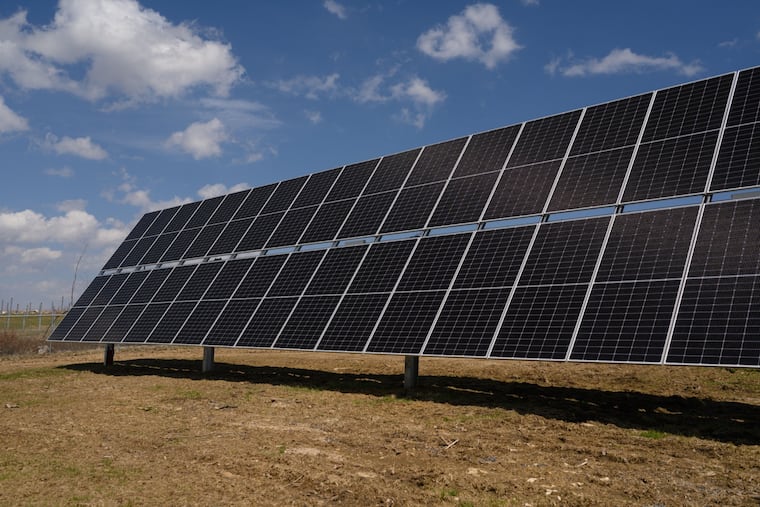Why this conservative supports renewable energy
Overdependence on natural gas is destroying the wallets of every Pennsylvanian.

Already this summer, Philadelphia and Pittsburgh have been sizzling in increasingly intense heat waves. Inevitably, along with those sky-high temperatures will come sky-high electric bills.
A big reason for this is Pennsylvania’s heavy reliance on natural gas for electricity generation. The price of natural gas has nearly doubled in just the past year — and will continue to rise because of European demand for U.S. natural gas in the wake of Russia’s invasion of Ukraine.
Before the current price spike, forecasters had expected it to take a decade or more for natural gas prices to double. But here we are.
About half of the electricity used in the Keystone State comes from natural gas-fired power plants, so when natural gas prices go up, so do electric bills. Unfortunately, the fact that Pennsylvania is a substantial natural gas producer does not affect the price here, as the gas prices are set by the global market.
With extreme heat waves becoming more common, it is critical that our state diversify its energy sources with renewables like solar and wind that are not subject to the global market or to price spikes caused by events half a world away.
In fact, electricity generated with solar and wind is often cheaper than electricity generated with natural gas or coal. Electricity from utility-scale solar is typically selling for between $15 and $30 per megawatt-hour (MWh), while electricity from gas and coal is now well over $60 per MWh.
“Electricity generated with solar and wind is now cheaper than electricity generated with natural gas or coal.”
Renewable electricity has the advantage of having no “fuel” costs since the sun and wind are free, and this energy can be banked via battery storage and called on as needed.
Given this dramatic change in the energy market and the urgent need for Pennsylvania’s utilities to diversify away from heavy reliance on natural gas, we need policies that help encourage the transition to cheaper and more price-stable energy sources.
One market-based program that does exactly that is the 12-state Regional Greenhouse Gas Initiative (RGGI), which Pennsylvania officially linked to on July 1. The RGGI is a cap-and-trade system across 12 Northeastern states that puts a price on carbon emitted by their electric power plants.
RGGI, which is patterned after the Reagan and Bush administrations’ successful approach to reducing acid rain, has proven it can reduce prices and pollution. For every $1 raised through RGGI and invested in energy efficiency or other programs in 2020, RGGI is producing $10 in energy bill savings.
When added together, consumers in RGGI states are on track to save $15 billion on their utility bills. The electricity prices speak for themselves: Prices in RGGI states have fallen 5.7% while prices increased 8.6% in the rest of the country.
Along with those savings comes better reliability. During this summer’s scorching heat wave in Texas, wind and solar energy did the heavy lifting in supporting the Texas grid, preventing the blackouts that have plagued the state in the past. “Renewables are bailing us out,” Michael Webber, an energy expert and professor at the University of Texas at Austin, recently explained.
» READ MORE: RGGI is not Pennsylvania’s best option to cut carbon | Opinion
Pro-capitalism conservatives like me have always advocated for following the market. It would be a costly mistake to abandon that approach now when the energy market favors solar and wind. And yet, opponents of RGGI including some GOP state senators and the coal lobby have filed suit to pause Pennsylvania’s participation in the program. A judge recently issued a preliminary injunction pending further deliberations.
Still, the natural gas lobby — along with its pals in the legislature — will dust off its old talking points and try to convince folks that crazy-expensive gas, which is currently doubling in price every year, is somehow still the answer. They want you to overlook the economic havoc that overdependence on natural gas is wreaking on the wallets of every Pennsylvanian.
Don’t fall for it. It’s easy to see the truth. Just look at your most recent electric bill.
David Jenkins is president of Conservatives for Responsible Stewardship.